| Listing 1 - 10 of 17 | << page >> |
Sort by
|

Abstract | Keywords | Export | Availability | Bookmark
 Loading...
Loading...Choose an application
- Reference Manager
- EndNote
- RefWorks (Direct export to RefWorks)
Policy sciences --- Idea (Philosophy) --- #SBIB:35H006 --- #SBIB:003.IO --- Ideas, Theory of --- Ideas (Philosophy) --- Theory of ideas --- Knowledge, Theory of --- Philosophy --- Memetics --- Policy-making --- Policymaking --- Public policy management --- Bestuurswetenschappen: theorieën --- Policy sciences. --- Idea (Philosophy).
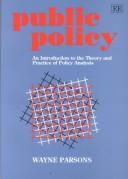
ISBN: 1852785543 1852785535 9781852785543 Year: 1999 Publisher: Aldershot Elgar
Abstract | Keywords | Export | Availability | Bookmark
 Loading...
Loading...Choose an application
- Reference Manager
- EndNote
- RefWorks (Direct export to RefWorks)
32.01 --- #SBIB:35H001 --- #SBIB:35H006 --- 32.01 Politicologie --- Politicologie --- Bestuurswetenschappen: algemene werken, referentiewerken, documentatie --- Bestuurswetenschappen: theorieën --- Policy sciences. --- Beleidskunde. --- Policy sciences --- Policy-making --- Policymaking --- Public policy management --- Public administration --- Political sociology

ISBN: 0393974219 9780393974218 Year: 1999 Publisher: New York: Norton,
Abstract | Keywords | Export | Availability | Bookmark
 Loading...
Loading...Choose an application
- Reference Manager
- EndNote
- RefWorks (Direct export to RefWorks)
Operational research. Game theory --- Game theory --- Policy sciences --- Decision Making --- Game theory. --- Policy sciences. --- Decision making. --- 519.8 --- 519.83 --- Operational research --- Theory of games --- 519.83 Theory of games --- 519.8 Operational research --- Decision making --- Policy-making --- Policymaking --- Public policy management --- Games, Theory of --- Mathematical models --- Mathematics --- Deciding --- Decision (Psychology) --- Decision analysis --- Decision processes --- Making decisions --- Management --- Management decisions --- Choice (Psychology) --- Problem solving
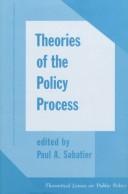
ISBN: 0813399866 9780813399867 Year: 1999 Publisher: Boulder Westview
Abstract | Keywords | Export | Availability | Bookmark
 Loading...
Loading...Choose an application
- Reference Manager
- EndNote
- RefWorks (Direct export to RefWorks)
Sociology of policy --- Sociological theory building --- Policy sciences --- Political planning --- #SBIB:35H006 --- #SBIB:35H400 --- #SBIB:IO --- #SBIB:012.IEB --- Bestuurswetenschappen: theorieën --- Beleid: algemeen --- Policy sciences. --- Political planning. --- Beleidskunde --- Beleidskunde. --- Planning in politics --- Public policy --- Policy-making --- Policymaking --- Public policy management --- Planning --- Politics, Practical --- Public administration
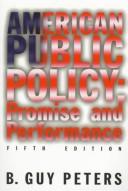
ISBN: 1566430674 Year: 1999 Publisher: Chatham London Chatham House Publishers
Abstract | Keywords | Export | Availability | Bookmark
 Loading...
Loading...Choose an application
- Reference Manager
- EndNote
- RefWorks (Direct export to RefWorks)
Beleidswetenschappen --- Policy sciences --- Politique [Sciences de la ] --- Sciences de la politique --- Political planning --- -#SBIB:35H415 --- #SBIB:35H6030 --- #SBIB:IO --- Planning in politics --- Public policy --- Planning --- Politics, Practical --- Public administration --- Policy-making --- Policymaking --- Public policy management --- Beleidscyclus: evaluatie --- Bestuur en beleid: nationale en regionale studies: Verenigde Staten --- United States --- Politics and government. --- Government --- History, Political --- #SBIB:35H415 --- Politics and government
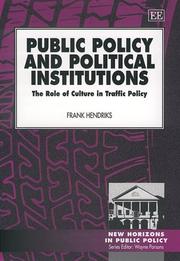
ISBN: 1840640642 Year: 1999 Publisher: Cheltenham : Edward Elgar,
Abstract | Keywords | Export | Availability | Bookmark
 Loading...
Loading...Choose an application
- Reference Manager
- EndNote
- RefWorks (Direct export to RefWorks)
Transportation, Automotive --- -Transportation, Automotive --- -Policy sciences --- #SBIB:35H500 --- #SBIB:35H400 --- #SBIB:35H438 --- #SBIB:011.IO --- Policy-making --- Policymaking --- Public policy management --- Automotive transportation --- Highway transportation --- Motor carriers --- Motor transportation --- Road transportation --- Automobiles --- Government policy --- -Government policy --- -Bestuur en samenleving: algemene werken --- Beleid: algemeen --- Beleidssectoren: openbare werken, verkeer en telecommunicatie --- Social aspects --- Policy sciences --- Bestuur en samenleving: algemene werken
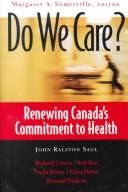
ISBN: 1282858173 9786612858178 0773567941 9780773567948 0773518789 9780773518780 0773518770 9780773518773 Year: 1999 Publisher: Montreal [Que.] McGill-Queen's University Press
Abstract | Keywords | Export | Availability | Bookmark
 Loading...
Loading...Choose an application
- Reference Manager
- EndNote
- RefWorks (Direct export to RefWorks)
One of Canada's preeminent social thinkers, John Ralston Saul, begins the book with a harsh reminder that public policy can be successful only when driven by the humanistic principles which fueled its formulation. Once saving money becomes a goal in itself, rather than "something we do on the side," public policy has little chance of survival. In subsequent chapters introducing the five key areas, Dr. Richard Cruess (McGill) and Dr. Sylvia Cruess (McGill) write on the physician's role in society; the Honourable Bob Rae tackles the political challenges of health care in the consumer era; Professor Raisa Deber (Toronto) looks at the rightful place of economics in health policy; Sister Nuala Kenny (Dalhousie) examines the ethical dilemmas we face; and Professor Bernard Dickens (Toronto) describes how current health care issues are perceived by the law. Other contributors represent a "who's who" of Canada's most highly recognized academics, professionals, and policy-makers. Also writing on clinical practice are Pat Kelly (PISCES), Dr. Terrence Montague (Merck Frosst), and Dr. Hugh Scully (Cardiac Care Network). The Honourable Monique Bégin, Mark Wainberg (International AIDS Society), and Rev. Lois Wilson (Senator, Canadian Parliament) write on politics. Nathalie St. Pierre (Fédération Nationale des Associations des Consommateurs du Québec), Devidas Menon (Institute of Pharmaco-Economics), and Dr. John Wade (Former Deputy Minister of Health, Manitoba) discuss economics. Tim Caufield (Alberta), Maurice McGregor (McGill), and Lesley Degner (St. Boniface Research Centre) consider ethical issues. Marcia Rioux (Roeher Institute), Jamie Cameron (York), and Henry Dinsdale (Royal College of Physicians and Surgeons) deal with the law. Do We Care? is a must-read for anyone involved in decision-making about the future of Canadian health care -- and for all of us who are affected by these decisions. Do We Care? is the result of a conference entitled "Directions for Canadian Health Care: A Framework for Sound Decisions" which was held in Toronto in October of 1998.
Electronic books. --- Medical policy -- Canada. --- Medical policy --- Health Policy --- Healthcare Policy --- National Health Policy --- Health Policies --- Health Policy, National --- Healthcare Policies --- National Health Policies --- Policy, Health --- Policy, Healthcare --- Policy, National Health --- Policy Making --- Canada. --- Health Care Policies --- Care Policies, Health --- Health Care Policy --- Policies, Health --- Policies, Health Care --- Policies, Healthcare --- Policy, Health Care
Book
Year: 1999 Publisher: Washington, D.C., The World Bank,
Abstract | Keywords | Export | Availability | Bookmark
 Loading...
Loading...Choose an application
- Reference Manager
- EndNote
- RefWorks (Direct export to RefWorks)
February 2000 - Some say that democracy is more likely to survive under parliamentary governments. That result is not robust to the use of different variables from the Database of Political Institutions, a large new cross-country database that may illuminate many other issues affecting and affected by political institutions. This paper introduces a large new cross-country database on political institutions: the Database on Political Institutions (DPI). Beck, Clarke, Groff, Keefer, and Walsh summarize key variables (many of them new), compare this data set with others, and explore the range of issues for which the data should prove invaluable. Among the novel variables they introduce: Several measures of tenure, stability, and checks and balances; Identification of parties with the government coalition or the opposition; Fragmentation of opposition and government parties in legislatures. The authors illustrate the application of DPI variables to several problems in political economy. Stepan and Skach, for example, find that democracy is more likely to survive under parliamentary governments than presidential systems. But this result is not robust to the use of different variables from the DPI, which raises puzzles for future research. Similarly, Roubini and Sachs find that divided governments in the OECD run higher budget deficits after fiscal shocks. Replication of their work using DPI indicators of divided government indicates otherwise, again suggesting issues for future research. Among questions in political science and economics that this database may illuminate: the determinants of democratic consolidation, the political conditions for economic reform, the political and institutional roots of corruption, and the elements of appropriate and institutionally sensitive design of economic policy. This paper - a product of Regulation and Competition Policy, Development Research Group - is part of a larger effort in the group to understand the institutional bases of poverty alleviation and economic reform. The study was funded by the Bank's Research Support Budget under the research project Database on Institutions for Government Decisionmaking (RPO 682-79). The authors may be contacted at tbeck@worldbank.org, gclarke@worldbank.org, pkeefer@worldbank.org, or pwalsh@worldbank.org.
Cabinet --- Candidates --- Constituents --- Decision Makers --- Decision Making --- Democracy --- E-Business --- E-Government --- Economic Theory and Research --- Election --- Election Data --- Elections --- Governance --- Government --- Industry --- Information Security and Privacy --- Legislation --- Legislative Powers --- Legislators --- Macroeconomics and Economic Growth --- Microfinance --- Parliament --- Parliamentary Government --- Parliamentary Governments --- Parliamentary Systems --- Policy Making --- Political System --- Political Systems --- Prime Minister --- Private Sector Development --- Public Sector Corruption and Anticorruption Measures --- Technology Industry

ISBN: 0198296525 9780198296522 Year: 1999 Publisher: Oxford : Oxford University Press,
Abstract | Keywords | Export | Availability | Bookmark
 Loading...
Loading...Choose an application
- Reference Manager
- EndNote
- RefWorks (Direct export to RefWorks)
Political planning --- Policy sciences --- Politique publique --- Sciences de la politique --- Economic aspects --- Aspect économique --- Industries --- Pressure groups --- Self-regulation --- -Industries --- -Pressure groups --- -332.43 --- Ba4 --- Advocacy groups --- Interest groups --- Political interest groups --- Special interest groups (Pressure groups) --- Functional representation --- Political science --- Representative government and representation --- Lobbying --- Policy networks --- Political action committees --- Social control --- Industrial production --- Industry --- Economics --- Policy-making --- Policymaking --- Public policy management --- -Self-regulation --- -Policy sciences --- -Political planning --- Aspect économique --- Economic aspects. --- Industries - Self-regulation - Congresses. --- Pressure groups - Congresses.
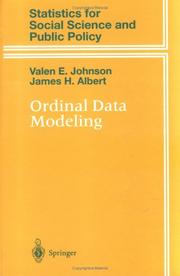
ISBN: 0387987185 9786610010561 1280010568 0387227024 9780387987187 Year: 1999 Publisher: New York : Springer,
Abstract | Keywords | Export | Availability | Bookmark
 Loading...
Loading...Choose an application
- Reference Manager
- EndNote
- RefWorks (Direct export to RefWorks)
Ordinal Data Modeling is a comprehensive treatment of ordinal data models from both likelihood and Bayesian perspectives. Written for graduate students and researchers in the statistical and social sciences, this book describes a coherent framework for understanding binary and ordinal regression models, item response models, graded response models, and ROC analyses, and for exposing the close connection between these models. A unique feature of this text is its emphasis on applications. All models developed in the book are motivated by real datasets, and considerable attention is devoted to the description of diagnostic plots and residual analyses. Software and datasets used for all analyses described in the text are available on websites listed in the preface.
Numbers, Ordinal --- Policy sciences --- Social sciences --- 519.22 --- Policy-making --- Policymaking --- Public policy management --- Ordinal numbers --- Number theory --- Proof theory --- Set theory --- 519.22 Statistical theory. Statistical models. Mathematical statistics in general --- Statistical theory. Statistical models. Mathematical statistics in general --- Statistical methods --- Mathematical statistics --- Statistics. --- Statistics for Social Sciences, Humanities, Law. --- Statistics . --- Statistical analysis --- Statistical data --- Statistical science --- Mathematics --- Econometrics --- Statistical methods. --- Social sciences - Statistical methods --- Policy sciences - Statistical methods
| Listing 1 - 10 of 17 | << page >> |
Sort by
|

 Search
Search Feedback
Feedback About
About Help
Help News
News